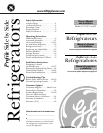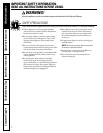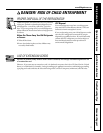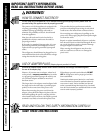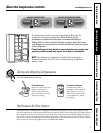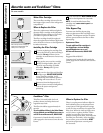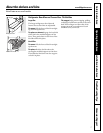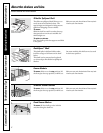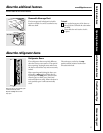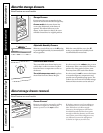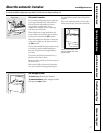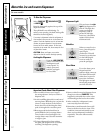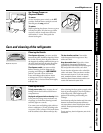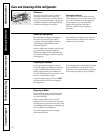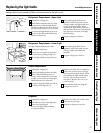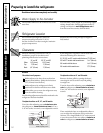
Consumer SupportTroubleshooting Tips
Operating InstructionsSafety Instructions
Installation Instructions
5
About the temperature controls.
www.GEAppliances.com
WARMERCOLDER
ADJUST REFRIGERATOR TEMP
9 IS COLDEST
WARMERCOLDER
ADJUST FREEZER TEMP
9 IS COLDEST
Testing and Adjusting Temperatures
The temperature controls are preset in the factory at 5 for both the
refrigerator and freezer compartments. Allow 24 hours for the
temperature to stabilize to the preset recommended settings.
Setting either or both controls to 0 stops cooling in both the freezer
and refrigerator compartments, but does not shut off electrical power
to the refrigerator.
Control settings will vary based on personal preferences, usage, and
operating conditions and may require more than one adjustment.
NOTE: The refrigerator is shipped with protective film covering the
temperature controls. If this film was not removed during installation,
remove it now.
Several adjustments may be required. Each time you adjust controls, allow 24 hours for the refrigerator to
reach the temperature you have set.
To test the refrigerator
compartment, place a
beverage on the top shelf.
After 24 hours, taste the
drink. If the temperature
is not satisfactory, adjust
the setting.
To test the freezer,
place ice cream in the top
basket of the freezer.
Check it after 24 hours.
If it’s too hard or too soft,
adjust the setting.
The Performance Air-Flow System is designed to maximize temperature control in the refrigerator and
freezer compartments. This unique special feature consists of the Air Tower along the top and back walls of
the refrigerator and the Air Tunnel on the bottom portion of the freezer rear wall. Placing food in front of
the louvers on these components will not affect performance. Although the Air Tower and the Air Tunnel
can be removed, doing so will affect temperature performance. (For removal instructions, on-line, 24 hours
a day, contact us at www.GEAppliances.com or call 800-GE-CARES.)
Performance Air Flow System



